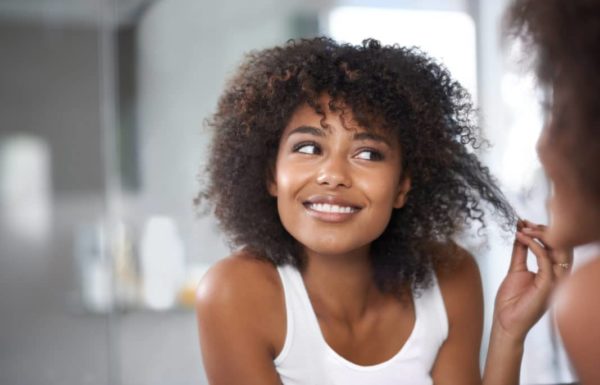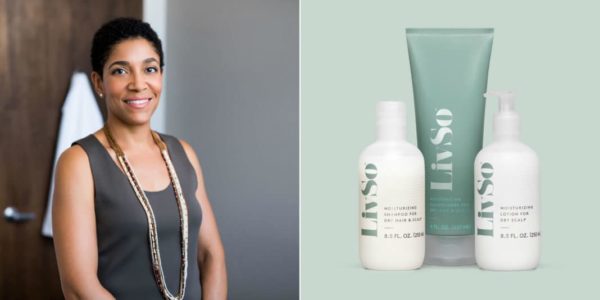
Winning Strategies for Scalp Care this Fall Credit: PeopleImages
Autumn is a natural period of transition. Temperatures drop and the air is less humid. I have noticed that in October my dermatology patients who don’t change their skin and hair routines come to the office with dry, flaky scalps. This environmental change is frequently the culprit.
A gradual or often sudden shift to fall weather results in real changes to our skin. We notice that our skin feels tight and itchy, and this can also include the scalp. Our skin and scalp lose more moisture during cooler weather because water evaporates more quickly from the skin than it does during warmer humid seasons. In order to prevent dandruff and scalp irritation, this problem needs to be addressed quickly.
Many people with dry, itchy scalp seek over-the-counter dandruff shampoos, the latest online DIY videos, hot oil treatments, and suggestions from stylists. Although heavy products, like nut butters or oils may seem like the right thing to alleviate dryness, these remedies may exacerbate malassezia. This type of yeast is routinely found on the skin and scalp, and is often implicated in the development of dandruff or seborrheic dermatitis. Seborrheic dermatitis is the medical term for extreme dandruff that often occurs on areas of scalp or face where more oil glands are present. It often looks dry and flaky and can lead to hyperpigmentation on brown skin. Contrary to popular belief, oils alone do not effectively hydrate the skin for a long period of time and can cause the dandruff to become worse.
Unfortunately, incorporating a scalp care routine to aid healthy hair is a new mindset for many. In my office, I usually start off by asking patients to describe their scalp and hair care routine, and if they don’t have one we work toward establishing one as soon as possible.
So, what can you do on your own this fall to help maintain a comfortable, healthy scalp, which will lead to healthy hair? First, get in the habit of simply caring for your hair and scalp on a regular basis. Get back to basics — wash and condition your hair at least weekly to cleanse and stimulate the scalp. Although you may not be sweating as much during colder, dryer months, it is still important to gently cleanse the scalp and condition the hair regularly. If you go to your stylist for regular shampoo and styling, great. If not, treat yourself to a spa night at home and make sure your hair is in good health.
I recommend using lukewarm water to shampoo. No matter how comforting it feels when it’s cold outside, avoid that long hot shower. Hot water can exacerbate dryness in your scalp and skin. Use products that are sulfate-free to shampoo and condition textured hair. It’s also helpful to use products that are anti-fungal in nature or discourage yeast growth (like xylitol) if dandruff is an issue.
Next, consider moisturizing natural hair more often at the roots with products like the LivSo Moisturizing Scalp Lotion, even if the wash and go’s become less frequent due to cooler morning temperatures. The scalp lotion contains ingredients (ceramides and fatty acids) designed with the skin barrier in mind. The barrier function of the skin is important because, simply put, it keeps moisture in and the environmental dangers out of our bodies.
Need extra help locking in the moisture you are feeding to your scalp and the roots of your hair? Try wearing a satin-lined cap at night or even while running errands if there’s a bit of a nip in the air. Having your hair in contact with satin rather than cotton or wool helps preserve the moisture traveling from your roots to the tips, which extends the life of curly hairstyles. If these efforts are not enough, consider a visit to your dermatologist or other health care provider to see if you may have a medical issue causing the dry scalp (like psoriasis, eczema, or other conditions like lupus) that may require a prescription.

Dr. Hicks-Graham (left). LivSo products (right)
I created LivSo haircare to provide moisture to your scalp, your curls and your kinks, which is key as the air gets dryer and your skin more prone to irritation. We want people to experience the relief of dry itchy scalp with hair that feels moisturized in the easiest, most effective way possible. If the humid summer air didn’t cause discomfort to your scalp, we want to keep it that way during the drier fall and the winter months. The LivSo Moisturizing System consists of three easy products that fit seamlessly into your year-round skin and hair routine. No more peeling aloe plants or dousing your scalp with apple cider vinegar on a cold Saturday morning. No more using pungent medicated shampoos for dandruff that weren’t formulated for the needs of textured hair.
Our products were clinically tested in a study over a three-month period to make sure that they were safe and effective. After four weeks, the study participants were found to have an 84 percent improvement in the symptoms and signs of their dry, itchy scalp. After 12 weeks, 97 percent of people thought that LivSo was the best system that they had ever used for their dry itchy scalp. Pretty effective, right?!
LivSo is scalp care — simplified.
Shari Hicks-Graham, M.D. is a Board-Certified Dermatologist practicing in Columbus, Ohio at Downtown Dermatology, LLC. She is the creator of LivSo, a hair and scalp care system specifically designed for textured hair clinically proven to improve dry, itchy scalp. Dr. Hicks-Graham is a proud graduate of Spelman College and the University of Pittsburgh School of Medicine. In her spare time, she enjoys her family and community service with local and national organizations including Delta Sigma Theta, Sorority, Inc. Visit LivSo.com to learn more about the products and her story. Also on Facebook and Instagram.


